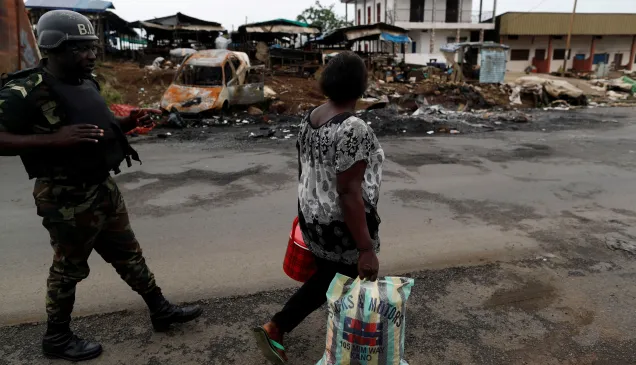Iraq: Life in Mosul through a child’s eyes
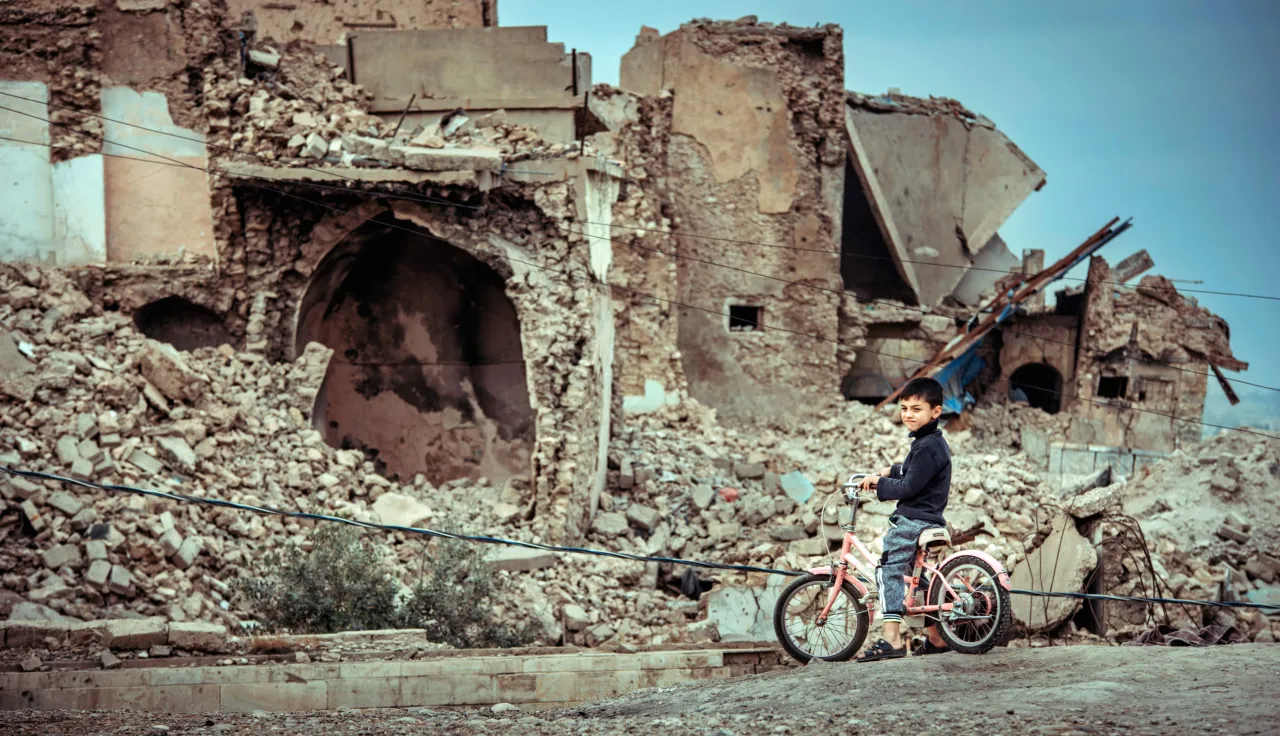
Four years after the violence ended, the once burgeoning city of Mosul still bears the scars of the fighting, with deserted neighbourhoods and ruins as far as the eye can see. The old city on the west bank of the Tigris river, known as the jewel of Mosul, still lies in ruins. Children play in the rubble or look for items to resell at the market.
Eight-year-old Yasin plays in the ruins of what used to be a mosque in the old city of Mosul. Despite the notices warning of unexploded ordnance, the boy and his friends play fearlessly in this desolate environment.
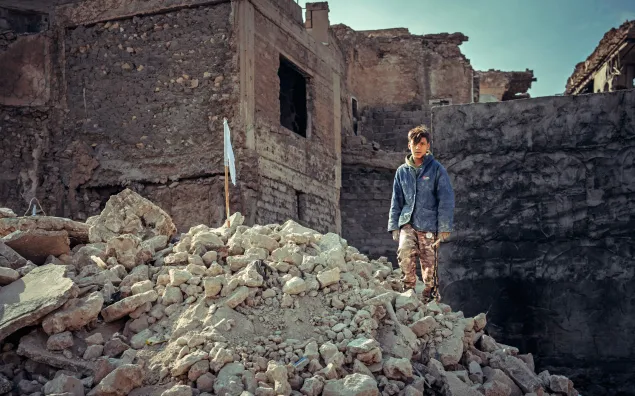
The children look for the white flags marking the buildings that have been cleared of mines.
The children look for the white flags marking the buildings that have been cleared of mines. Then they start digging in the piles of rubble, on the hunt for anything of value that can be resold. As a main source of income, this activity means they also venture into non-cleared areas.
"There are some dangerous places here that we are not allowed to play in because of mines," says Yaqeen, age 11. She lives in Mosul's old city and remembers a time before the war. "Before the conflict, we had a shop here and I had friends," she says. "We used to go out and play."
Many of Mosul's former residents have not returned because of the hidden unexploded ordnance. Grenades, bombs and rockets lie in wait for the innocent. All it takes is one false move for lives to be changed forever.
The fighting may be over, but the war continues.
Thousands of people who fled the fighting are unable or unwilling to come back. Without the huge investment needed to rebuild the city, business opportunities are rare.
Mosul, the capital of Nineveh province, lies close to Turkey and Syria and was once one of the most important cities on the Middle East trade route.
Despite the fact that some basic infrastructure, such as sewers and roads, has been repaired, much more needs to be done, particularly in terms of homes and health care.
The situation is bleak and it is a challenge to survive in this inhospitable environment, but some families have returned. Others never left and endured the terrible consequences of war.
Footage from Mosul is available in our AV Newsroom: link.
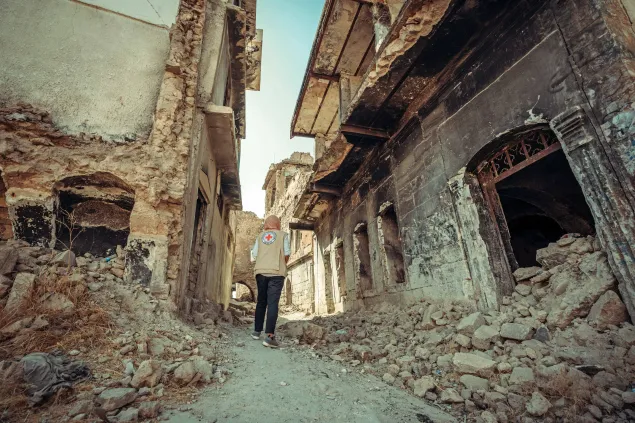
Without the huge investment needed to rebuild the city, many of Mosul's former residents will not come back.
Ghanem is one such resident. He was eight years old in 2017 when he was at home in West Mosul when a rocket hit his house. He lost his leg there and then. The scene was so horrific that his mother was too afraid to even pick him up and seek help. "He was in pain and screaming, there was blood everywhere," recounts his mother Anwar.
The recovery was long and painful for a boy who, like most of his age, used to enjoy racing around. After two long years of being immobile, he was fitted with a prosthetic leg at the ICRC's physical rehabilitation centre in Mosul.
An artificial leg has meant Ghanem can reclaim his childhood. "I can run, play ball and go to the store again," he says. "I went once with my friends to the market and I was walking so fast that they lost track of me. I had to walk home by myself," he says with a smile.
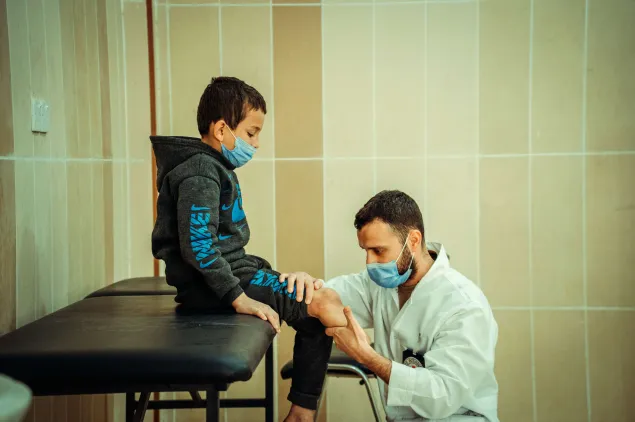
Ghanem lost his leg when a rocket hit his house in 2017.
Sarah, Ghanem's sister, was also in the house when the rocket hit. She now spends her day in a wheelchair or in bed. Her mother Anwar says that Sarah's spinal injuries are too complicated to be treated at the local health-care centres. She is desperate as she cannot afford to take Sarah elsewhere for expensive surgery. The longer Sarah spends without the right care, the lower her chances of ever being able to stand and walk again.
Overcoming the trauma of that terrible day will not be easy for anyone in the family. Sarah and Ghanem also lost a brother and a sister in the blast.
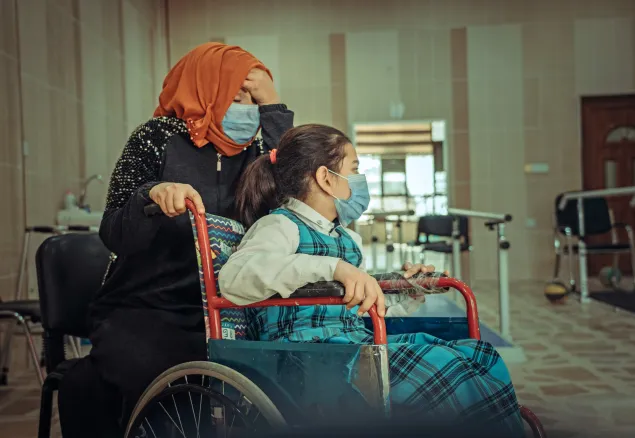
Sarah, Ghanem's sister, was hurt as well. She spends her day in a wheelchair or in bed.
Humanitarian aid will not be enough
Residents face chronic water and electricity shortages. A recent study by the ICRC found that fewer than 15 per cent of people on Mosul's left bank – the eastern half of the city – currently have enough water to meet their daily needs. On the right bank, this number was higher but still only 35 per cent. This is partly because the war destroyed vital infrastructure, such as water pumping stations.
The conflict may have ended, but people's needs in Mosul – and the wider Ninawa governorate – are still huge. The extent of the damage means that humanitarian aid alone will not be enough. Mosul will require continued national and international investment to repair its deeply damaged infrastructure and to ensure communities have access to basic services like shelter, water, electricity and health care.
Watch Yaqeen's story, the young girl who wants to become a doctor
Her name is Yaqeen.
Yaqeen means certainty in Arabic, and we are certain that she'll become one of #Iraq's best doctors.
4 years since the end of the conflict in #Mosul.
Returnees are facing plenty of challenges to cope.
For others, returning is simply not an option. pic.twitter.com/BwOvckh95q— ICRC Iraq (@ICRC_IQ) December 13, 2021



